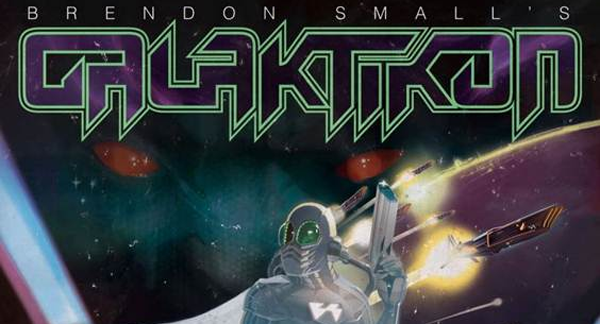
Album Review: Brendon Small's "Galaktikon"
Brendon Small’s “Galaktikon” is as much a story about finishing what you started as it is the divorce of the galaxy’s most popular superhero. Halfway invested prior to the recording of “Dethalbum II,” Small shelved this ad-hoc unfinished project until such a time as he could return to it and complete it. From that end, “Galaktikon” is anything but a typical vanity project, and shows not only Small’s dedication to his artistic exploration, but also his loyalty to Gene Hoglan and the musicians who helped him create it. He doesn’t want their work to be for nothing. In the end, “Galaktikon” is a project that treads the tenuous line between purpose and listenability (which I’m aware is not actually a word.)
Small has insisted that this album should best be viewed as an “audio comic book,” and it is through this lens that “Galaktikon” is not only acceptable but begins to show the craft that went into the story, particularly when viewed as a sort of antithesis to Fabian Nicieza’s iconic “Wedding of Scott Summers and Jean Grey.” Small creates the character of Triton and then immediately plunges him into a messy and terribly public divorce, where ultimately his ex-wife is tricked into bedding Triton’s nemesis. Hijinks ensue in a plot that is a sort of bizarro-world version of “Tristan and Isolde.”
One of the advantages that comic books have always enjoyed as a story telling medium is the ability to convey powerful emotions through color control. Fully equipped with Small’s impressive array of vocal styles and manipulations, “Galaktikon” plays up to its creator’s standard admirably; much like a comic, the music is alternately bright (“Arena War of the Immortal Masters,”) and sullen (“Beastblade”) as the mood of the plot unfolds. Vocally, Small leaves his Nathan Explosion growl at home, but comes equipped with a phalanx of other affectations at his disposal, ranging from straight vocal singing to a low murmur that best equates as an imitation of Chris Cornell on the quiet parts of the first Audioslave album.
The prime tool that assists Small in his narrative is, as one might expect, his guitar. Dramatic, artistic and thunderous as the mood dictates, the instrument serves to color and advance the story as much, if not more, than the lyrics do. Small centers the effort around his six string, giving it a level of authority usually reserved for mythical objects like Thor’s hammer, The Spear of Destiny, or some other item worthy of Wagnerian bombast. “Dangertits,” Small’s acrobatic and flighty homage to guitar virtuosos, exists solely on this premise.
Those looking for shades of Dethklok will probably be disappointed. “Galaktikon,” as Small described to me in our interview, is his willful exploration of the kind of adrenaline-infused, high-motor arena rock that so populated his musical upbringing. To that end, the album meets at the unlikely crossroads of Dragonforce and Bad Company, sprinkled over with the kind of rhythm-carrying, deep backbone perfected by the Clash in 1979. The best examples of this come at the beginning and the end, with the high-speed adventure of “Triton” and the crowd-stirring “On My Way,” featuring Small’s best solo, which rides on top of the musical wave. Lest anyone think the album goes only at one speed, take a moment to study the morose and thudding “Beastblade,” a track with a well-defined slogging pace and an unavoidable sneer. Despite the crescendo in the second half, this song clearly illustrates a character that is dark and foreboding.
“Galaktikon” has a few shortcomings which cannot be ignored. The first and foremost, from which the others stem, is that it quite frankly feels side-project-y. Remember that this is an album borne from idle time in a studio, hastily thrown together in order to prevent musicians’ time from being wasted. To that end, it feels a tad underdeveloped, like the seams don’t quite meet properly in the corners. While Small creates a number of infectious riffs and rhythms, they don’t stick to the ribs, and most of them seem to center around one or two common cadences and gallops. Subsequent listens of the album don’t yield any secrets that a listener might miss the first time, and a lot of the most memorable moments and big choruses sound similar to each other. A constant plague of concept albums is that not every piece can be effective when dealing with the same story and this is no exception. “You Can’t Run Away” doesn’t add anything special to the experience, while “Truth Orb and the Kill Pool” doesn’t hit like it wants to, and so those two songs back to back derail some of the record’s momentum in the middle.
While “Galaktikon” is likely worthy chapter and verse in the ‘Bible of Small’ that fanboys somewhere are painstakingly crafting, it’s probably not one of the gospels. It is the probable fate of “Galaktikon” that music collectors, myself included, will pull it from the shelf with a crinkled, wizened hand to display for our next of kin, adding “Brendon Small once did a side project called “Galaktikon,” on top of everything you know him for.” This relegates it to the status of such lofty and enjoyable projects as Big Dumb Face, Body Count, Samhain and Chris Cornell’s R&B album. Enjoy it for what it is; a solid, fun effort that intentionally takes itself too seriously. An album doesn’t have to move mountains to be worth a spin, so take a second to scope out “Galaktikon.”

